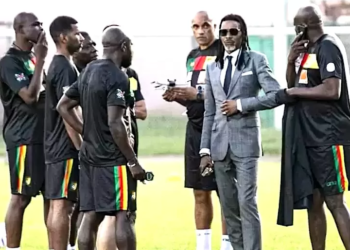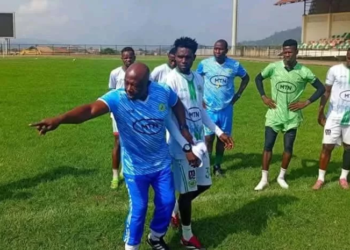A total of 32 countries will take part in the greatest sporting event in the world, to be co-hosted by Japan and South Korea, starting May 31. Of these, Africa has five qualifiers – Cameroon, Nigeria, Senegal, Tunisia and South Africa.
…However, unlike in the 1998 edition of the four-yearly event, Africa’s five representatives lack the confidence necessary for this kind of show. Soccer pundits are of the opinion that preparations of the African teams have been haphazard, which may see them not go past the preliminaries. During the 1998 event in France, won by the host nation, Africa was represented by Cameroon, South Africa, Nigeria, Egypt and Morocco.
And although only Nigeria survived the gruelling first round to advance to the second, the other four sides gave a good account of themselves.
It was thrilling for the continent’s soccer lovers to see Nigeria beat one of the European giants, Spain, 3-2 in one of the first-round matches, the winning goal coming from mid-fielder Sunday Oliseh through a long-range scorcher.
The best ever the continent has fared in the Cup was in 1990 in Italy, when Cameroon, spearheaded by the indefatigable Roger Milla, reached the quarter-finals. Cameroon were headed for the semis, but they fell in the quarters in the match against England, victims of two controversial penalties.
What are Africa’s chances and hopes this time around?
It is always a dicey affair to rule out a team off-hand, or for that matter over-rate it. But going by the five countries’ performance in the recent Africa Cup of Nations in Mali, it would be safe to say that only Cameroon and maybe Senegal have what it takes to match such great sides as Brazil, France, England, Argentina, Germany and Portugal.
During the Mali event, Nigeria were a pale shadow of what they were in France in 1998. Their stars then – Oliseh, Okocha, Kanu and Taribo West – took part in a tournament they would like to forget in a hurry.
In their recent warm up matches, Nigeria drew 1-1 with Paraguay, before struggling to beat a disjointed Scottish national side 2-1. Against Scotland, the Nigerian defence, the team’s Achilles heel, played without purpose and was lucky to have conceded only a solitary goal in the first half. Against Kenya two weeks ago in Lagos, the Super Eagles playing without most of their more established stars, were dominated by Harambee Stars, to the chagrin of their diehard fans.
Coach Festus Adegboye Onigbinde has called up a number of greenhorns, but most Nigerians feel that he should have included workhorses like Victor Ikpeba and Daniel Amokachi-their indiscipline notwithstanding-can rise to the occasion on a good day.
South Africa’s live-wires – Benny McCathy and Siyabonga Nomvete – seem to have lost the spark that made them darlings of many soccer followers in Africa and Europe. Coach Jomo Sono has his work cut out: he must get Bafana Bafana back to playing fluent soccer again. Their 1-4 loss in a recent warm-up match against Georgia, a world soccer nonentity, must have given the tactician a lot of food for thought.
After Tunisia bowed out early in Mali, soccer observers said it had been a grave mistake for them to qualify for the World Cup at the expense of better sides like Morocco and Egypt.
The surprise team in Mali was Senegal, who were denied their first ever Nations Cup title through a penalty shoot-out against Cameroon. The team has discipline problems, which their opponents are likely to take advantage of. How exhilarating it was to watch such players as Al Hadji Diouf, Ferdinand Coly, Mohammed Diallo, Coulibaly and Fadiga. If Senegal fails to qualify to second round of the World Cup, it will be merely due to lack of experience and indiscipline. Coach Bruno Metsy has no doubt done a commendable job and the team’s 2-0 victory over Bolivia in a recent warm up should goad them into more action.
Cameroon’s experience in past World Cups speaks for itself. This leaves the Indomitable Lions as Africa’s greatest hope for glory in Japan and South Korea.
Like Germany or Italy, Cameroon may not entertain you on the pitch, but they have a way of getting the right results. Besides, this is one team with character: winning two consecutive Nations Cup on penalties corroborates this fact.
Cameroon’s sheer presence, ebullience and determination on the pitch stand them in good stead for at least a quarter-final repeat of 1990.











